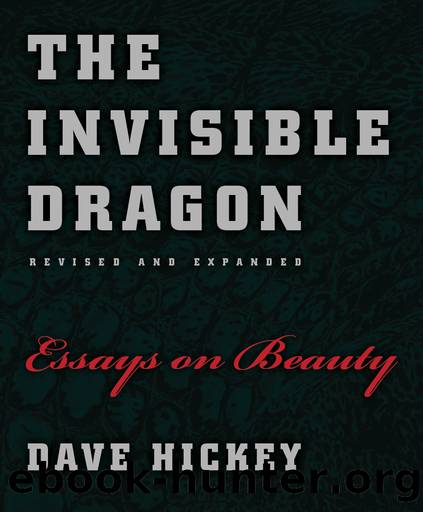The Invisible Dragon: Essays on Beauty by Dave Hickey

Author:Dave Hickey
Language: eng
Format: epub
Publisher: The University of Chicago Press
Published: 2009-12-14T16:00:00+00:00
The analogy I wish to draw here is blatant. The rhetoric of beauty tells the story of those beholders who, like Masochâs victim, contract their own submissionâhaving established, by free consent, a reciprocal, contractual alliance with the image. The signature of this contract, of course, is beauty. On the one hand, its rhetoric enfranchises the beholder; on the other hand, it seductively proposes a content that is, hopefully, outrageous and possible. In any case, this vertiginous bond of trust between the image and the beholder is private, voluntary, and a little scary. And, since the experience is not presumed to be an end in itself, it might, ultimately, have some consequence beyond the encounter.
The experience of art within the therapeutic institution, by contrast, is presumed to be an end in itself. Under its auspices, we play a minor role in the masterâs narrativeâthe artistâs taleâand celebrate his autonomous acts even as we are offhandedly victimized by the workâs philosophical power and ruthless authority. Like princes within the domain of the institution, or jailhouse mafiosi, such works have no need of effeminate appeal. And we, poor beholders, like the silly demimondaines in Sadeâs Philosophy of the Bedroom, are presumed to have wandered in, looking for a kiss. So Pow! Whatever we get, we deserveâand what we get most prominently is ignored, disenfranchised, and instructed. Then we are told that it is âgoodâ for us.
Thus has the traditional, contractual alliance between the image and its beholder (of which beauty is the signature, and in which there is no presumption of received virtue) been supplanted by a hierarchical one between art, presumed virtuous, and a beholder presumed to be in need of it. This is the signature of the therapeutic institution. And although such an institution, as Barr conceived it, is scarcely imaginable under present conditions, it persists and even flourishesâusually in its original form but occasionally under the administration of right-thinking creatures who presume to have cleansed its instrumentality with the heat of their own righteous anger and to use its authority (as the Incredible Hulk used to say) as a âforce of good.â
This is comic-book thinking for bureaucrats. In fact, nothing redeems but beauty, its generous permission, its gorgeous celebration of all that has previously been uncelebrated. If we entertain, even for a moment, the slightest presumption that an institution, suddenly and demonstrably bereft of its social and philosophical underpinnings, is liable to imminent collapse, we have committed what George Bernard Shaw considered the most suicidal error that a citizen can. As Shaw pointed out, institutions die from loss of funding, not lack of meaning. We die from lack of meaning and of joy.
Download
This site does not store any files on its server. We only index and link to content provided by other sites. Please contact the content providers to delete copyright contents if any and email us, we'll remove relevant links or contents immediately.
Kathy Andrews Collection by Kathy Andrews(10516)
The remains of the day by Kazuo Ishiguro(7549)
Spare by Prince Harry The Duke of Sussex(4194)
Paper Towns by Green John(4168)
The Body: A Guide for Occupants by Bill Bryson(3797)
Be in a Treehouse by Pete Nelson(3211)
Harry Potter and the Goblet Of Fire by J.K. Rowling(3036)
Goodbye Paradise(2957)
Never by Ken Follett(2877)
Into Thin Air by Jon Krakauer(2699)
The Remains of the Day by Kazuo Ishiguro(2617)
The Genius of Japanese Carpentry by Azby Brown(2606)
The Cellar by Natasha Preston(2594)
Drawing Shortcuts: Developing Quick Drawing Skills Using Today's Technology by Leggitt Jim(2531)
120 Days of Sodom by Marquis de Sade(2434)
Architecture 101 by Nicole Bridge(2348)
The Man Who Died Twice by Richard Osman(2293)
Machine Learning at Scale with H2O by Gregory Keys | David Whiting(2278)
Fairy Tale by Stephen King(2061)
